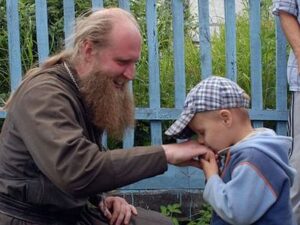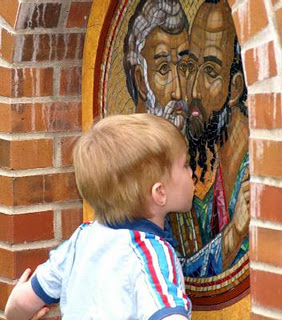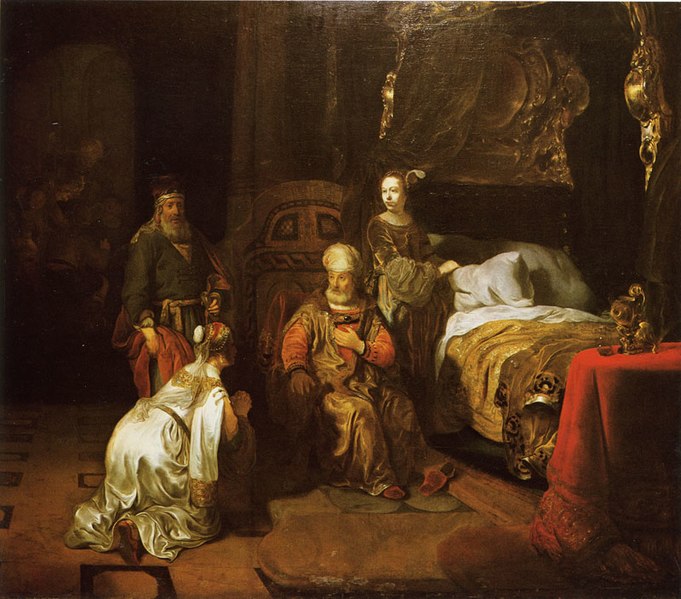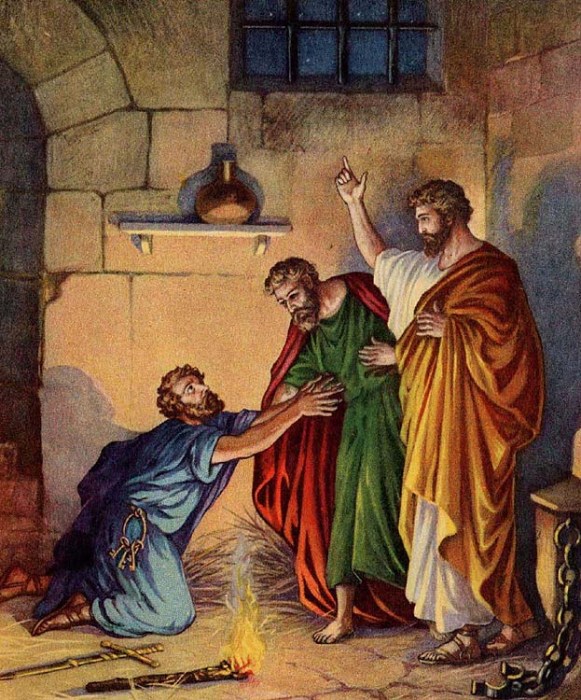A reader recently wrote:
My greatest struggle with Orthodoxy is the veneration of saints, angels, and Blessed Mary. In the Book of Revelations there is a scene that plays on 22:8 where John bows to an angel and the angel rebukes him. Typically, Roman Catholic and Orthodox say that he was rebuked for trying to worship the angel (not venerate). The problem though (in my view) is that is the Beloved Apostle. He devoted his life to the God of Israel and when Jesus came to Jesus the Messiah (also God). He wrote one of the four Gospels. He would not worship an angel. It seems to me that that was veneration that he was offering and not adoration, but he was still rebuked for bowing. I can’t see how John would commit idolatry and worship the angel. He would try to veneration though. So if we cant bow to angels how can we bow (in veneration) to images?
My response
I took a look at Revelation 22:8. The text says: “I John am he who heard and saw them. I fell down to worship at the feet of the angel who showed them to me . . . .” I also checked the Greek text and found that there were two verbs used here: “epesa proskunesai.” (ἔπεσα προσκυνῆσαι NA28) The first verb “epesa” takes the aorist past tense of “fall down” and the second verb “proskunesai” (to worship) takes the infinitive form indicating the reason or motive for the action. You are right that John would not want to worship an angel but the infinitive of intent for “proskunesai” indicates that that was what he had intended when he fell down. Basically, the physical act of bowing is not intrinsically wrong. What was wrong was the intent behind the bowing, that is, bowing as an act of worship. The basic problem with your argument then is that it fixates on the first verb and ignores or overlooks the second verb. This misreading of Revelation 22:8 is not good exegesis. In other words, Orthodoxy, which is open to veneration, is on much solid scriptural ground than Protestantism, which shuns veneration.
If we look at Scripture we can find instances where people bowed to show respect to another person. In Genesis 33:6-7, we read that Jacob’s wives and children bowed before Esau during the family reconciliation. In 1 Kings 1:16 and 23 (RSV), we read that King David’s wife, Bathsheba, and the Prophet Nathan bowed down before the king. Verse 16 says that Bathsheba “bowed and did obeisance to the king.” In the book of Acts, the Philippian jailer fell down before the Apostle Paul asking “What must I do to be saved?” Paul did not rebuke the jailer because the jailer was attempting to show respect to the man he earlier treated as a lowlife criminal.
Bowing in ancient times was a common practice with a range of meaning, from social courtesy to religious devotion. It seems that Protestantism has become hypersensitive to the physical act of bowing in their reaction against Roman Catholic medieval piety and in their attempt to purify the church.
The key difference between veneration and worship would be offering a sacrifice. This is what we find in Acts 14 when Paul and Barnabas learned to their horror that the citizens of Lystra were about to offer a sacrifice of oxen to them, believing Barnabas to be an incarnation of Zeus and Paul an incarnation of Hermes (Acts 14:11-15). Similarly, in Orthodoxy we may bow to show respect to Mary and the saints, but the core of the Liturgy is the Eucharist in which the bloodless sacrifice of Christ’s body and blood is offered to God alone. During the Liturgy the Orthodox faithful also offer up our whole lives to Christ our God, which is in accordance with Romans 12:1. The important thing to keep in mind is that the center focus of Orthodoxy is the worship of the Trinity: Father, Son, and Holy Spirit. Mary and the saints are peripheral. Not that they are ignored (as so often happens in Protestantism) but they are peripheral much like the supporting cast who surround the star of the show. Protestant spirituality can be likened to a Jesus-and-me spirituality. For many Protestants converting to Orthodoxy is a lot like a girlfriend who gets taken to her boyfriend’s home and meets all of his relatives. If she is serious about her relationship with the boyfriend, she is going to have to accept his larger family as well.

Bowing in Japan
The Protestant objection to bowing has disturbing cultural implications. If bowing is so intrinsically wrong, then Asians who become Christians are obligated to refrain from bowing to their parents, which would be taken as highly disrespectful and offensive. Furthermore, this position runs contrary to the Ten Commandments which enjoined honoring one’s father and mother—at least in the way Asians who apply it.
Protestantism’s Roots in Modernity
I suspect that the Protestant reservation about bowing stems from their being Western and their being modern. Modernity has resulted in a flattening of social relations and a break from traditional culture which assume hierarchical relations. This flattening effect can be seen in the Reformed tradition’s rejection of the episcopacy and their not addressing ministers as “Father.” This way of thinking is tragic and contrary to history. It is contrary to Christianity’s roots in Judaism and to the Tradition of the Church Fathers. Even early Protestant creeds used the language of hierarchy in social relations, even explicitly speaking about “inferiors and superiors.” See the Westminster Larger Catechism Q. 126 to Q. 133 which expounds on the Fifth Commandment.
In the eyes of Moderns, secularist and even Christians, all hierarchies are considered unjust and corrupting, and therefore to be scorned and done away with. Protestants have been at the forefront of espousing republicanism and the abolition of monarchies. Oliver Cromwell, a devout Puritan, led the movement to abolish the episcopacy in England and for a time headed the short-lived republican Commonwealth of England. This leveling influence can also be seen in Hawaii’s history where the leading haole (White) Congregationalist church (descended from the New England Puritans) openly supported the overthrow of the Hawaiian monarchy.
Protestantism’s new social dynamic had unintended consequences for faith and practice. Where the early Reformers retained a sacramental worldview and respected social hierarchies, later generations of Protestants reduced the sacraments to mere symbols, eliminated the office of the bishop, and expressly forbade the honoring of saints calling it sinful. Protestantism’s sola scriptura elevated the sermon to a position of prominence in the Sunday service and relegated the Eucharist to the periphery. But it did not end there; in recent years the sermon has undergone further changes. Where before the Protestant pastor would strive to give the unvarnished truth of God’s word based on careful exegesis, now the sermon has devolved into an inspiring or comforting message to please the audience. Many Protestant pastors have become religious entrepreneurs. Church members have become customers whose loyalty the pastor must retain in order to keep the religious enterprise going. This is religious commercialism where the customer is king and evangelism involves marketing a useful product. In this new religious context the Gospel—the Good News of Christ—is no longer the eternal truth of God but what suits the taste of the current market.
In contrast to Protestantism’s constantly evolving forms of worship is the Orthodox Church’s adherence to the historic forms of worship. A visitor to an Orthodox Sunday service will get to see the fourth century Liturgy of Saint John Chrysostom. Orthodoxy’s liturgical style of worship retains a sense of dignity and hierarchical ordering long gone from from much of Protestantism. One notable example of this are the Small Entrance and the Great Entrance when the priest and the acolytes process around the interior of the church. Orthodoxy’s rubrics and protocols provide a much needed corrective to the casual informality of modernity.
Hierarchy and the Biblical Worldview
How we worship God and how we live do matter. They are intertwined to an extent far more than we realize. Our understanding of society and human nature is impacted by our rituals and practices. The small act of bowing is consequential because it embodies the Orthodox ethos and worldview. To venerate the saints is to accept Orthodoxy’s hierarchical and sacramental worldview, where the heavenly realm overlaps with the earthly. The Protestant rejection of bowing reflects a flat, egalitarian approach to social relations, and a utilitarian, non-sacramental approach to nature.
Modern humanists of the Enlightenment who espouse egalitarianism don’t like the practice of veneration. They scorn it as “worshiping man,“ but they are wrong. It is not sinful to give honor to another human being but a practical acknowledgement of the way reality works. All men are not equal in every respect. Hierarchies do matter. There are hierarchical orders in our schools, in the workplace, in the military, in the hospitals, in our government. Why, then, do Protestants insist that churches be devoid of hierarchical order? We honor our graduates, our heroes, and those who made a contribution to society. Why not face up to the fact that some Christians are indeed worthy of our appreciation, esteem, and honor?
Protestants should also face up to the fact that according respect to our elders and those above us is part of the biblical worldview. In the Old Testament youths were exhorted to show respect to their elders.
Stand up in the presence of the aged, show respect for the elderly and revere your God. I am the LORD. (Leviticus 19:32; NIV)
In the New Testament, the laity was encouraged to honor the clergy.
Let the elders who rule well be counted worthy of double honor; especially those who labor in the word and doctrine.(1 Timothy 5:17; OSB)

Kissing Priest Hasnd
Becoming an Orthodox Christian involves not just learning and accepting a body of teachings, but also entering into a cultural ethos. For Protestant inquirers, it means relinquishing their rugged self-independence and accepting the Church as our Mother. An important mark of an inquirer’s readiness to become Orthodox is humility. Calling a priest “Father” can be difficult for some Protestant inquirers but it marks an important milestone in their journey to Orthodoxy. Calling a priest “Father” is an acknowledgment that the priest stands as a representative of Jesus Christ and has the awesome responsibility of pastoring Christ’s flock. At his ordination the priest is invested with the authority of the Orthodox Church and acts as a representative of the bishop, who stands in apostolic succession. In light of this, addressing a priest as “Father” is an act of showing respect to the Lord Jesus. It is also important to know that the priest’s authority is not arbitrary but is based upon and constrained by capital “T” Tradition. His authority is valid so long as he remains faithful to Tradition. The priority of capital “T” Tradition provides a much needed safeguard against arbitrary power and spiritual abuse.
Hierarchy and the Coming Age
Hierarchical ordering is not just for the present age but also for the age to come. The Apostle Paul in 1 Corinthians described the coming age in which the resurrected saints will live in a glorified state.
All flesh is not the same flesh, but there is one kind of flesh of men, another flesh of animals, another of fish, and another of birds.
There are also celestial bodies and terrestrial bodies; but the glory of the celestial is one, and the glory of the terrestrial is another. There is one glory of the sun, another glory of the moon, and another glory of the stars; for one star differs from another star in glory. (1 Corinthians 15:39-41; OSB)
It is worth noting that there will be different grades of glory among the saints. This can be inferred from “one star differs from another star in glory.” They all belong to the same category of being but differ with respect to status.
When Orthodox Christians venerate the saints they are showing respect to their older brothers in the faith. Undergirding the spirituality of venerating icons is element of prayer, of relationality. When I venerate an icon I usually ask the saint to pray for me or for someone I have in mind. Without prayer, venerating icons become a superficial, perfunctory ritual. Underneath the venerating of the saints is a combination of affection and respect we show to our elder brothers and sisters in the Faith. This awareness of the importance of showing respect to older siblings or to older peers in school or the work place can still be found in Asian cultures. Present day Asians still have this appreciation for hierarchical order whereas this has largely disappeared in the West and in the U.S. where the culture of modernity has obliterated the old way of life.
Making Faith Real
Let me close with a personal observation that the Orthodox practice of bowing to show respect brought a physicality to my spiritual life that I did not experience as a Protestant. In many ways Protestantism is a cerebral religion and of which one unintended consequence is the mind-body split that weakens one’s spiritual development. The deep-seated individualism in Protestant spirituality has given rise to the plethora of denominations undermining their sense of belonging to the Church Militant. It has also led to Protestants suffering a spiritual disconnect with the Church Triumphant. This can be seen in widespread historical amnesia among Protestants and their refusing to venerate the saints. For me, becoming Orthodox has brought a deeper sense of belonging to the historic Church, a stronger sense of alignment with the biblical worldview, and an appreciation of integration into the cosmic order—the saints and the angels gathered before the throne of God as described in Revelation 7.
To sum up, the Orthodox veneration of the saints and the angels are not something added on to Christianity but deeply rooted in the biblical worldview and very much a part of the historic Christian Faith. The Protestant disavowal of the veneration of the saints marks a departure from the historic Christian Faith and created a new form of spirituality. Thank you for your question which has led me to a deeper appreciation of a “minor” practice within Orthodoxy. I hope that this response addresses your concerns and helps you to continue on in your journey to Orthodoxy.
Robert Arakaki
References
Douglas Cramer. “Call No Man Father?” Antiochian Orthodox Christian Archdiocese.
John S. Morrill. “Oliver Cromwell: English Stateman.” Britannica.com
“On Kissing the Priest’s Hand.” OrthoChristian.
W. Stanford Reid. “John Calvin: One of the Fathers of Modern Democracy.” Christian History Institute
Q. 126 to Q. 133 — Westminster Larger Catechism.






Robert, thank you once again. I will incorporate this page into the study for our catechism classes.
1. Moving beyond the Tradition, and just an observation, isn’t it interesting how the Protestant concept of egalitarianism had effected many/some of today’s societal woes–NOT to blame Protestants for all of the problems we presently confront. But from a cultural sociology point of view, society is seen as Darwinian & linear, today’s man knows better than yesterday’s man and Tradition is eschewed…affecting the role of the family in society.
2. I also appreciate your reference to entrepreneurial religion wherein the focus is placed on the pulpit and not the sacrifice.
God bless,
In XC
Thank you Father Nectarios! And I pray for God’s blessings on your catechism class!
Robert
Dear Robert, although I do not object to ‘veneration’ per se, I do not think the exegesis is quite as straight forward as you suggest. The thing that has bothered me is that as others have pointed out, Orthodox veneration uses the Greek term ‘proskunesis’ and worship is ‘latreusis’. What the angel is objecting to here is ‘proskunesis’. Language, of course, changes, so what ‘proskunesis’ is now in the church may very well be different than what it was in Revelation, but it is complicated by the fact that this is the same word used in all your Old Testament examples of “bowing down”. In the Roman Catholic church the distinction is between ‘veneration’ and ‘worship’. The Latin verb where we get ‘veneration’ from also was used of worship of the gods. So, again, we have a complicated relationship between the current terminology and the meaning of the words as they applied in the ancient world. On the other hand, I agree with the direction you were going with regard to Asian Christians honoring their parents by bowing. The scriptures often have language that seems contradictory at face value and must be resolved by consideration of circumstances. The example of Jesus saying that you should call no one “father” because you only have one father seems contradicted by Paul saying that he is Timothy’s “father”. So, again, just because Revelation uses the common Greek word for “venerate/bow in reverence” when referring to what John did does not automatically rule out veneration of the Saints. I do think that Protestants have a point though, inasmuch as the angel’s response reminds John that there are no created beings that are not fellow-workers for the same kingdom and king. Only the king is properly to be revered. This same idea of angels being ministers for our salvation and our surprisingly exalted status above the angels is echoed in various places in the New Testament, most notably the book of Hebrews. Anyways, all that to say that exegesis by scripture alone will not solve the dispute (which, of course, you demonstrate by the rest of your arguments).
Prometheus,
I very much appreciate your insightful comments. You are right that the situation is not all that simple, but I believe that the evidence from the New Testament points to “proskunesis” having the meaning “to worship.” In Matthew 28:17, we read about the disciples gathering in Galilee and when the eleven disciples saw Jesus they worshiped him. The Greek text has “προσεκύνησαν” which the RSV rendered as “worshiped.” Even more interesting is Matthew 2:11 which states that the Magi “fell down and worshiped him” (πεσόντες προσεκύνησαν). Again the RSV uses “worship” for “proskunesis.” I draw your attention to the fact that the word pair is the same as that used in Revelation 22 albeit with differences in tense, modality, and aspect. I would be interested to learn if you could find a bible translation that rendered “proskunesis” in Revelation 22:8 as to “venerate” or “honor” which would then lead us to conclude that Revelation 22:8 teaches that we are to refrain from giving honor to angels. And, you are correct in noting that the meaning attached to words can shift over time as likely had happened in the prokunesis/latreia distinction made at the Seventh Ecumenical Council in 787.
Robert
This is one (two) of the most often asked questions by my Protestant friends and family. Veneration and Prayers to the Saints.
My niece just recently asked me about it a couple of weeks ago. She texted me saying, “1 John 2:1 “My dear children, I am writing this to you so that you will not sin. But if anyone does sin, we have an advocate who pleads our case before the Father. He is Jesus Christ, the one who is truly righteous.”
I read that verse this morning and thought, “is the advocate who pleads our case before the Father” expanded to include the saints for Orthodoxy? Is that why one who choose to pray to them? That’s still the part of Orthodoxy I struggle with the most. Why not just talk to God directly? He made that way possible, so why would anyone choose to talk to a Saint instead??”
I replied to her with a standard text / reply I give many people. I said, “Yes. Very good!
And you can just go to God the Father through Jesus. But if you ever ask someone else to pray for you you’re not doing that.
I would say think about the difference between intercession and mediator.
Look at this passage that mentions both and makes a distinction.
“Therefore I exhort first of all that supplications, prayers, INTERCESSIONS, and giving of thanks be made for all men, for kings and all who in authority, that we may lead a quiet and peaceable life in all godliness and reverence. For this is good and acceptable in the sight of God our Savior, who desires all men to be saved and to come to the knowledge of the truth. For there is one God and ONE MEDIATOR between God and men, the Man Christ Jesus, who gave Himself a ransom for all…” 1 Timothy 2:1-6a
Then from the Council of Nicaea in 787 A.D. here is proof the Church has always understood the difference:
”God and the saints are addressed differently. We implore God to grant us the blessing which we want, or to deliver us from evil. We implore the saints to intercede for us to God, who grants the petitions. Therefore, we pray to God to have mercy on us and we pray to the saints to pray for us. It is strictly incumbent on all to beware, lest they transfer to any creature the rights which belong strictly to God. We do not adore any creature, nor honor the saints as though to adore them, but we call upon them as brothers and as friends of God, and therefore we seek assistance from these our brethren, who have departed.“
She replied, “Ohhhh, now I understand! Thank you!
That part from the Council of Nicaea– very good! And totally helps me understand. You’re not praying TO saints; it’s more like your asking someone who’s departed to pray for you.
The Council definitely knew and warned “for all to beware” that nothing which belongs to God alone should be given to the Saints.”
It simply takes a humility and willingness to look at church history with open eyes and an open mind ready to close on what is good and true.
May God grant us all continued humility and love for our Protestant brothers and sisters. Thank you for your work in doing just that!
Dear Innocent,
Thank you for your comment. I believe that it is important that we always treat Protestants with respect and take their concerns seriously. I benefited from people who patiently listened to my questions and concern in my journey to Orthodoxy. The questions and objections from Protestants can often force us to reexamine Holy Tradition. Prometheus’ comment has forced me to take another good look at the Greek text of the New Testament. As the saying goes: Iron sharpens iron.
Robert
Very interesting and helpful as usual. Thank you.
As you have mentioned in other posts, the physical and the “spiritual” false dichotomy always seems to be in play. The imagination of the Reformed/Evangelical seems to say, Jesus is out there, we’re in here. The Bible connects us to the “out there”, the physical does nothing to help get to Jesus “in here”. But, when this sort of gnostic dualism is removed, you don’t think of priest for example and Jesus “out there” – you have Christ in our midst – mirrored or mirrored and windowed at the same time “in here” all of the time because it’s Christ’s Church. He is not only present in the Word, or Sacrament, but He is with us literally among us, above, under, through, a million other prepositional phrases. If we cannot believe this, we must become something of a dualist. Veneration is given to those who have proved loyalty to Christ, they are with Christ, not separate from Him. He is in their midst. They are venerated in the company of Christ. One verse that has always stuck with me, Hebrews 6:10 For God is not unrighteous to forget your work and labour of love, which ye have shewed toward his name, in that ye have ministered to the saints, and do minister. God is said to be unrighteous to forget the labor of love – important connection – laboring loving to His name/glory, and yet we somehow, can be righteous yet forgetting the laboring of our own brothers and sisters? It doesn’t follow. If someone imagined veneration as a Saint perhaps, standing in a small crowd with Jesus at the center., bowing from left to right, then kneeling/prostrating before Jesus, returning to bow to those with Him, I don’t think anyone would get that worked up. It’s the disconnect imaginatively when you move these Saints off on their own, it makes them something like autonomous little deities. On top of this, the inbred presupposition of Original Sin/Total Depravity creates the reasoning that no one deserves veneration because no one has ever had the capacity of will to will with God anyway, pre or post-conversion so virtue is never really someone else’s by the grace of God but is merely an imputed reality. I tend to think our tact is more to remove the root of this issue even if it is a harder task. Theosis which is taught way back in Genesis means Saints are possible, but not only possible, they are the intention of Creation – always with Christ, in His family, always with, never alone. If theosis was swapped for the whole Augustinian/Calvinistic system, the Bible logic that is there, would be persuasive. I’m not sure how someone can so easily identify idols with Saints when theosis is man’s destiny with Christ, always with Him. Idols don’t have this connection, identity, as operating with Christ. It’s always – it seems – something standing apart from, on it’s own – that either is a full substitute or a God, “and” this.. syncretism or apostasy. That’s how it seems when you read the OT prohibitions and the 1st Commandment. How that could enter the imagination of the Saint venerator is impossible for someone who knows that the Saint is within the company of Christ and who understands that Jesus is Lord, and who realizes that everyone but God is a creature.
Matt, I appreciate your comments!
Robert
While this is a good defence of bowing, it seems not to answer the reader’s question: why would St John, of all people, worship an angel?
Dionysius,
The reader’s main concern was with the Orthodox practice of venerating the saints. He then presented Revelation 22:8 as justifying the injunction against bowing to saints. This article attempted to show that the act of bowing is not necessarily wrong so long as the intent is not to offer worship. While the reader did not raise the question as to why John the Apostle would attempt to worship an angel, let me offer this possible solution to your question: mistaken identity. Robert Mounce in his NICNT commentary on Revelation mentioned that the worship of angels had infiltrated first-century Judaism and was resisted by the early Christians as well but this to me is more of tangent than a solution.
Robert
Question: when you say that the difference between worship and veneration is offering a sacrifice, what do you mean by a sacrifice?
For example, I just heard Fr. Josiah Trenham sharing a story about how he once lost $800, went home, baked some bread for St. Phanourios and placed it before his icon, and then, voila, the lost $800 showed up the next day.
Isn’t that a sacrifice?
And, come to think of it, at the orthodox parish, I often see $20 bills, and the occasional $100 bill, stuffed inside or behind icons, after watching parishioners going up to these icons, praying to them, offering incense to them, before stuffing the currency in/behind them….
Isn’t that sacrifice?
Far too often, I see the orthodox throwing around this “veneration/worship” distinction, but often in actual practice, it seems to be a distinction without a difference.
Bastion Harm,
By sacrifice I had in mind the Eucharist in which Christ’s Body and Blood are offered for the salvation of the world.
As for the examples you gave, I have never heard of them. Can you give me the reference to the anecdote about Father Josiah Trenham baking some bread for Saint Phanourios? Was it on a particular YouTube video?
And with respect to Orthodox Christians stuffing dollar bills inside or behind icons, can you give me more specific information like the name of the parish, jurisdiction, and country where you see this happening? But I would say that I have never of such a practice. It sounds like an unusual practice that deviates from Orthodoxy. So any information you have on this would be greatly appreciated.
Robert
Excellent article my friend! keep up the good work!